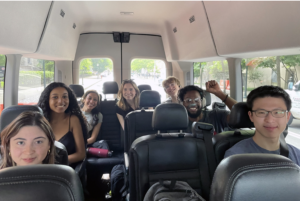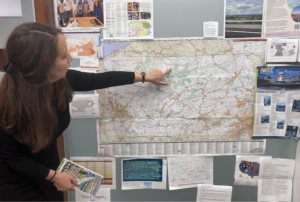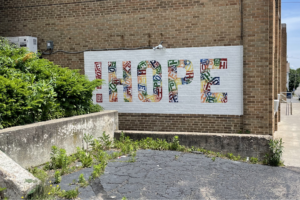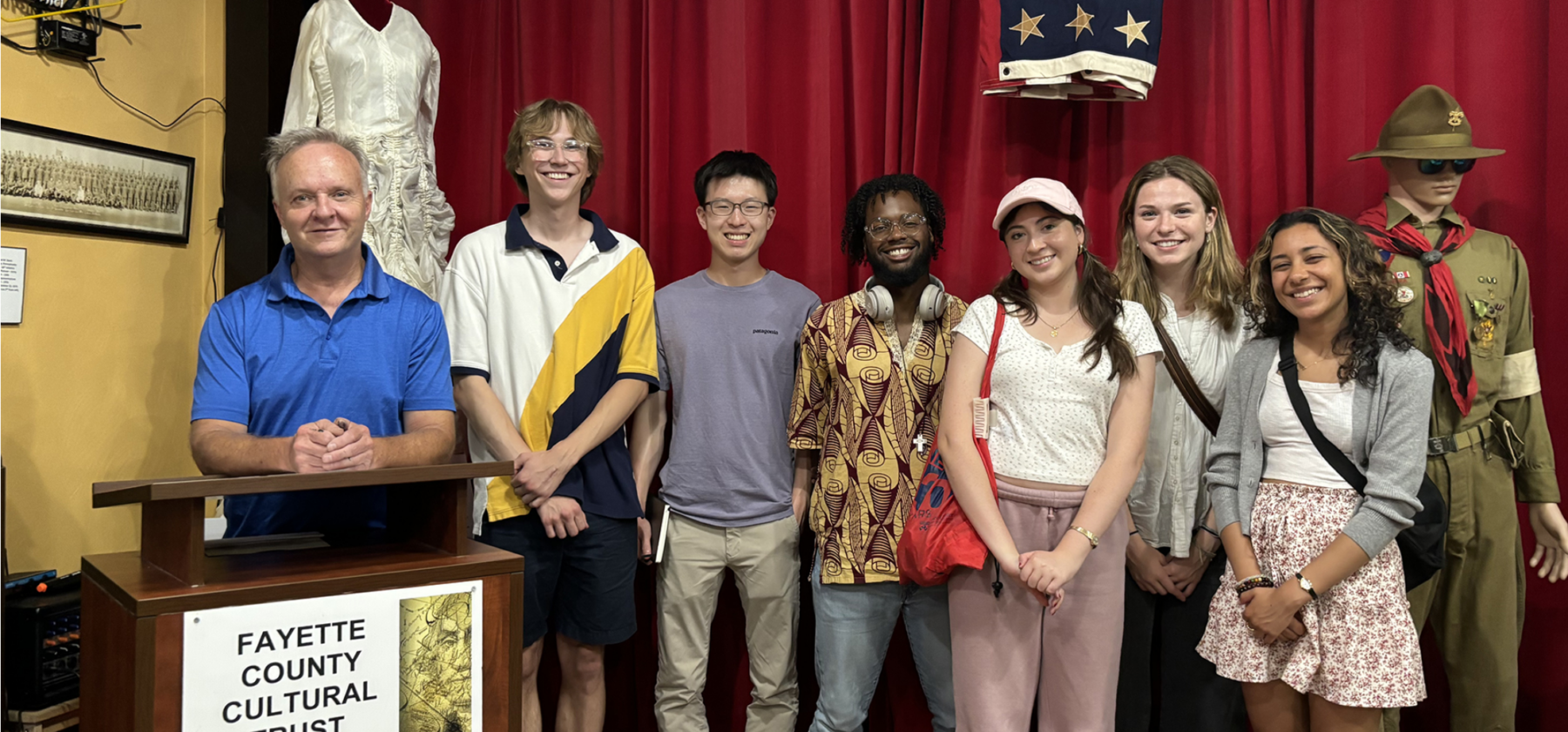On the morning of June 3, seven Penn undergraduate students and recent grads stepped into a 13-seater van with political scientist Lia Howard of the SNF Paideia Program for what would be the first of five trips to all corners of Pennsylvania. The group had a weeklong orientation and talked about how to approach strangers. Noah Kocher says when they arrived in Allentown, he was nervous about approaching people he didn’t know.
The second-year English major was paired up with Natalie Vasquez, a third-year political science and urban studies major. After speaking with a man they stopped on the street, they walked into a spiritual shop, where Vasquez bought a bottle of holy water to facilitate a conversation with the woman at the counter.
After they left, an older woman who was also visiting the store began a conversation in Spanish with Vasquez, who translated to Kocher while walking back to the van, past construction workers and a Dominican restaurant and a newly built bus terminal. The woman talked about struggles with the economy and prices in Allentown, Vasquez says, before turning to a more positive narrative about how she was glad young people now had places to hang out.
These conversations were part of the Political Empathy Lab, a 10-week paid research experience that took students across the Keystone State this summer. As they covered 2,500 miles and encountered ideas and people from all sorts of backgrounds, students exercised approaches for facilitating dialogue across differences.

“It’s hubris to think we can just understand people by knowing their demographic facts,” says Howard, director of the Political Empathy Lab and the fellows director of the SNF Paideia Program. “What if we took away all the things we think we know and we just get dropped into different parts of Pennsylvania?”
Along with approaching strangers to ask about their lives and values, students joined prearranged meetings with community leaders. They met with current and former county commissioners, school board members, and state representatives from both major parties. They met with a librarian in Lancaster who talked about bomb threats over a planned drag queen story hour, a Dickinson College political science professor, and former congressman Conor Lamb, a graduate of the College of Arts & Sciences and Penn Carey Law.
Howard wanted to mix up the group’s accommodations, which meant staying at the historic Omni William Penn Hotel in Pittsburgh, a farm, and a hotel near gas stations and a Denny’s restaurant.
After leaving Allentown, the group went to Scranton and then New Milford. The next day, they visited Hazleton, a small city in Luzerne County where the Hispanic population increased from under 5% in 2000 to more than 60% as Dominican immigrants migrated there from New York City.
The second trip was to the Harrisburg-Lancaster-Lebanon-York area, where a visit to the Capitol building took the students past a sloth and snake, advocates for the legalization of recreational marijuana, and Boy Scouts. (June 11 was simultaneously Zoo Day, Cannabis Day, and the location for a Boy Scouts news conference.)
The next trip was Philadelphia and the suburbs. After the first presidential debate but before the July assassination attempt on former President Donald Trump, the Political Empathy Lab made their way across southern Pennsylvania to Pittsburgh. Just after President Joe Biden announced he was dropping out of the race, the students embarked on their final trip, an 840-mile round-trip journey to Erie.
Howard says after each location, every student had to produce an “empathy map” about what they saw, heard, said, did, and felt, which she describes as “a way to get to observation before interpretation.” At the end of the trip, each student produced a short writeup on an issue, such as abortion, climate change, and immigration.
Stepping outside the Philadelphia area
Howard has taught a course called Political Empathy and Deliberative Democracy three times. She says the concept of deliberative democracy has been around for a while but is about speaking to people, whereas this course leans heavily on a concept emerging in the political science literature: democratic listening.
Political empathy is grounded in learning how to connect to understand, “and I’m pretty firmly committed to this idea that people and place are connected,” Howard says. “You’re not going to do a good job connecting with people if you haven’t connected with place and vice versa.”
She pitched the idea of the Political Empathy Lab to Provost John L. Jackson Jr. more than a year ago. Howard says she presented this “as a really critical summer to study Pennsylvania, but not to study it in the ways that I think we’re used to studying it, which is large data sets, but studying it at a human scale at a human speed, meaning walking up to humans and talking to them.”
The Office of the Provost, SNF Paideia, and Trustees’ Council of Penn Women funded the program, and each student received a stipend. Students traveled in rotating pairs, which Howard says was important for safety and allowed one person to take notes. They also had to identify their affiliation with Penn at some point in each conversation.
The students brought into this experience their own diverse backgrounds and perspectives—and their curiosity. Coming from Wauwatosa, Wisconsin, Autumn Cortright says she grew up “exposed to a lot of different areas that have very different political colors.” But Cortright, a fourth-year student majoring in philosophy, politics, and economics (PPE) and classical studies, says she wanted to better understand what makes a swing state a swing state.
Vasquez grew up in La Quinta, a desert resort city in the Coachella Valley of California that she describes as divided between the largely Hispanic farm-working community in the east and the more affluent population of retirees and snowbirds in the west. Prior to Penn’s Quaker Days for admitted students, she had never been to the East Coast.
Vasquez says she didn’t really have any misconceptions or preconceptions or any knowledge of Pennsylvania before the class. “I did realize in embarking on this journey, I was going to be talking with folks from more rural backgrounds, but I was just happy to learn,” she says, “I always want to know people’s stories.”

Kocher is from Phoenixville, about 28 miles northwest of Philadelphia, and says there are parts of the state he knew of but hadn’t been to, such as Erie. “That’s a major gap in the knowledge of the place that I live,” he says, “so that was super important to me, just getting out and connecting with the state that I’m from a bit more.”
Prior to the trip, Howard thought people might react to the Political Empathy Lab with suspicion or view her as an “educated elite,” but she says they had very few negative experiences and was struck by how generous people were with their time. She also found that people in many parts of the state shut down just hearing the word “politics,” and so the team started leading with “issues” and other words.
Connecting across communities
Some scheduled meetings came about through connections made by Michael Smith, senior director of commonwealth relations for Penn, who met with Howard before the trip and with the group in Harrisburg. Other Penn staff members and alumni enthusiastically introduced the Political Empathy Lab to family and colleagues across Pennsylvania.
They met over dinner in Harrisburg with Republican state Rep. Tom Mehaffie and at a restaurant in Indiana with Dave Reed, a Penn alum and former Republican state representative who served as Majority Leader.
Reed says he shared that when he entered office in 2002, “we used to argue about policy on the House floor, and after we were done, everybody went to dinner together, and that was Republicans and Democrats.” But by the time he left in 2018, he says, there were people from the same party who couldn’t be in the same room, let alone with someone across the aisle.
“I think what they’re doing with the lab, it’s small-scale but it helps bridge that gap,” Reed says. “I give Dr. Howard and the group of students so much credit for exploring other thought processes and other environments, and other challenges and issues that maybe they haven’t confronted in their lives.”
In Cumberland County, former Democratic County Commissioner Jim Hertzler organized a meeting with a former Republican commissioner and the deputy mayor of Carlisle. Hertzler says he talked to the students about the levels of government in Pennsylvania, as he thinks a lot of people don’t understand the local structures that oversee the commonwealth’s 500 school boards and 2,560 municipalities.
“It’s where the rubber hits the road. If your trash is not getting picked up or the snow’s not getting plowed or there’s a pothole in the street, it’s usually the local government official who’s responsible to the citizens,” Hertzler says. He also shared with the students how he and his Republican colleague worked together to fund a farmland preservation program.
On the fourth trip, the Political Empathy Lab met with Penn alum Donald Bonk, president of the Penn Club of Western PA and an economic development consultant at Carnegie Mellon University. Originally from Johnstown, where his parents operated a grocery store for 41 years, Bonk previously worked as an international trade manager for Pennsylvania and served on a rural advisory board for Biden’s 2020 campaign.
Bonk says he talked to the students about the culture of western Pennsylvania and tried to impress upon them the importance of respect, noting, “When I go to the family reunion, I’m not not going to eat a hot dog with my cousin who voted differently. The country is pretty divided, but in western Pennsylvania, you still have to go shopping, you have to go to the family reunion, you have to get your car fixed, where many family members, friends, and neighbors may think and/or vote differently than you do.”
He set up a meeting for the group at Balance Restaurant in Johnstown with people in local government and economic development, inviting a Tribune-Democrat reporter to cover the convening. Bonk also set up a meeting with Steve Wray, executive director of Carnegie Mellon’s Block Center for Technology and Society, giving students the chance to learn about the latest impact of artificial intelligence on elections from a political expert and campaign veteran.
Bonk says he thought the students “were great ambassadors for the University of Pennsylvania. They were polite, respectful, and asked really great questions.”
On the final trip, the students stayed one night in Mansfield on a 100-acre farm owned by John and Sandy Folzer, whose daughter knows Howard from working at Penn. The Folzers made dinner for the students, and Kocher and Cortright went swimming in their pond, and the group went to sleep on beds, couches, and an air mattress in the farmhouse.
Earlier in the day, Sandy Folzer joined the group for a trip to the Troy Fair. Vasquez approached a couple at a booth with a large gun, which they were raffling off, and talked to them about what the fair was like in previous years. Cortright spoke with a local deputy sheriff, a drone operator, a trapper who had pelts and taxidermy with him, and the owner of a solar panel business.
Kocher talked to a woman from a Republican committee about writing and artificial intelligence before getting into her views on politics and abortion. He says the first conversation on the first day in Allentown broke down the door to eventually talking to several people at the fair and not feeling worried about it.
“Not that starting a conversation with a stranger is ever easy,” Kocher says, “but from how scared I was doing it the first time to eight weeks later doing it in Troy and Erie and all the places we went on our last trip, that’s just something notable to point out.”
Vasquez says she is putting in place what she learned this summer in her program studying abroad this fall. Speaking to Penn Today from her orientation in New York before heading to Buenos Aires, Barcelona, and then Cape Town this semester, Vasquez says the Political Empathy Lab “has helped me place empathy at the center of it all, at the center of the data.”

Cortright says she can now connect more with family and with people whose politics she was previously too scared to ask about. “I’m able to more effectively construct this space that feels like they’re not going to be judged if they say what they think, and that’s been incredibly helpful,” she says. “I think I’m fully equipped for Thanksgiving this year.”

